Does your skin itch at night? This skin itchiness at night is referred to as nocturnal pruritus. Itchy skin at night can result from natural changes in your body temperature, water loss at night, dry skin, or sometimes, from an underlying health condition. Additionally, it can cause sleep disruption regularly. We discuss possible causes of this condition and natural remedies.
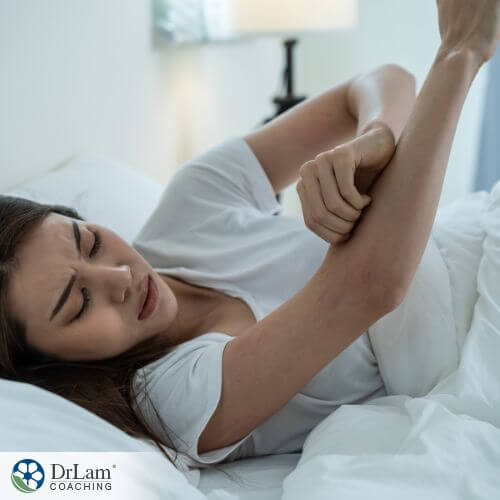 Nocturnal pruritus is a condition characterized by an urge to itch and scratch your skin during the middle of the night. Roughly one-quarter of adults in the United States will deal with chronic pruritus or long-term skin itchiness in their lifetime. Furthermore, itchy skin at night most often affects the arms, legs, and torso. However, it can affect any area of your skin.
Nocturnal pruritus is a condition characterized by an urge to itch and scratch your skin during the middle of the night. Roughly one-quarter of adults in the United States will deal with chronic pruritus or long-term skin itchiness in their lifetime. Furthermore, itchy skin at night most often affects the arms, legs, and torso. However, it can affect any area of your skin.
According to the Mayo Clinic, itching of the whole body could be a symptom of an underlying health condition, like liver disease, kidney disease, anemia, diabetes, thyroid problems, and particular cancers. Whole body itching at night can leave you with an intense urge to scratch all over your skin. As such, this can keep you up and disrupt your night’s sleep.
Several potential causes of nocturnal pruritus include:
In an autoimmune condition, your body's immune system may mistakenly attack your healthy cells when it cannot distinguish between normal cells and a foreign invader. The result can be itching, inflammation, or swelling. A 2019 review in Frontiers in Immunology suggests that itching is a common symptom in some autoimmune diseases and autoimmune-associated skin conditions. These include atopic dermatitis, psoriasis, autoimmune bullous diseases, dermatitis herpetiformis (Duhring’s disease), lupus erythematosus, Sjögren’s syndrome, and vitiligo.
A high body temperature during the night has the potential to cause itchy skin. A natural increase in your body temperature and blood flow occurs at night as your body adjusts to keep you warm. This increase in the heat against your skin's surface could make your skin feel itchy. Research published in the European Journal of Pain suggests that there’s a relationship between heat/warmth sensations and itching and that changes in temperature on the skin can cause it to itch, particularly for those with atopic dermatitis.
Allergic reactions to certain foods, like milk, egg, wheat, peanuts, or shellfish, could lead to itchy skin at night depending on when you eat and how long it takes before your body develops a response. According to Cleveland Clinic, a food allergy could cause your skin to itch at night, and the itch can be all over your body or in just a specific area of your body.
Itching is associated with liver disease and it usually worsens in the late evening and the night according to Healthline. For some individuals, the itch may be in one area, like a limb, the soles of the feet, or the palms of the hands. However, other individuals may have itching all over their bodies. A 2015 article in Dermatology Research and Practice suggests that one possible cause of itching due to liver disease is that liver disease can increase the levels of bile salts, which can build up under the skin, causing itching. However, more research is needed to establish whether this is a causative factor.
 Your skin loses water at night, and this loss of moisture causes dehydration and dryness. Also, when the skin becomes dry, it loses its natural oils called sebum. Your skin might appear rough, cracked, and scaly because of dehydration. This can cause your skin to become itchy.
Your skin loses water at night, and this loss of moisture causes dehydration and dryness. Also, when the skin becomes dry, it loses its natural oils called sebum. Your skin might appear rough, cracked, and scaly because of dehydration. This can cause your skin to become itchy.
Your body produces more hormones during the day than at nighttime. Hormonal imbalance can cause excessively dry skin. A drop in estrogen levels, for instance, can cause a decline in sebum oil production, leading to skin dryness. Menopause and pregnancy are common causes of this kind of hormone change, contributing to nighttime skin dryness, flushed skin, or itchy skin. Also, it’s not unusual for some menopausal women to describe experiencing the sensation of ants crawling under their skin.
Itch-inducing substances (known as pruritogens) can cause problems at night. Your body’s cells produce these substances for different reasons, including the management of inflammation. Histamine is a well-known substance, which your immune system produces during an allergic reaction. Environmental factors, like the weather, can also trigger histamine release. Histamine binds to particular receptors that fire up nerve endings in the skin, causing itchy skin at night.
Eczema is an inflammatory skin condition that causes long-term itchiness, dry skin, scaly patches, and rashes. At night, eczema becomes more sensitive and symptoms tend to worsen because of temperature changes that the body goes through, or the need for more skin moisturizer.
According to a research article published in the International Journal of Molecular Sciences, nocturnal pruritus may be connected to the circadian rhythm of itch mediators. The circadian rhythm can cause different changes that could potentially increase nocturnal pruritus. Some of these changes include:
There are particular instances when skin itchiness is a sign of more serious health problems. Some cases include:
The symptoms of nocturnal pruritus can vary from person to person depending on the cause. Also, you may have several symptoms emerge at once or only a few. The primary symptom is itchy skin during the night and the urge to scratch your skin. However, other symptoms may include:
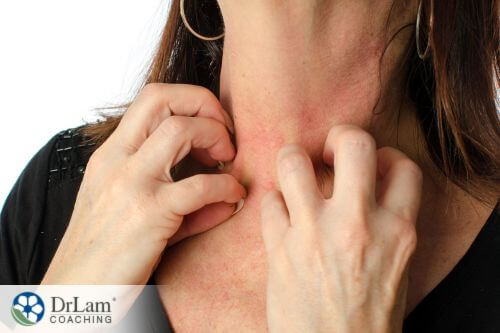
A good time to visit your doctor is when you notice that:
An assessment of nocturnal pruritus usually begins with your doctor getting a complete medical history, followed by a physical exam. You may be asked a series of questions to help determine the cause of your symptoms. These may be related to when symptoms started, history of allergies, recent health changes, the type of clothing you wear to bed, or the use of new skincare products.
Certain tests could also help determine the cause of itchy skin at night. These include:
Dry skin is one of the accompanying symptoms of Adrenal Fatigue Syndrome (AFS), which is caused by chronic stress. The NeuroEndoMetabolic (NEM) stress response and the adrenal glands normally handle stress, but if the stress doesn't abate over a long period, they can become depleted of essential resources to make hormones to manage stress. Levels of cortisol, the stress hormone, can climb and then drop, and the adrenals become weak. If your adrenals are weak, your aldosterone hormone levels will drop. Subsequently, you will become more dehydrated, which causes drier skin. Skin dryness can lead to nighttime itchy skin.
The Detoxification circuit is a part of the NEM system and helps to fight stress. The interstitium, immune system, and liver make up the Detoxification circuit, and they work to remove extra reactive metabolites from the body. Poor detoxification and liver problems also contribute to itchy skin. Thus, it is important to balance hormone levels, support liver health, keep stress low, and keep your skin hydrated and itch-free.
Lotions are one option to reduce itching. When choosing lotions for your nighttime itching, oil-free, fragrance-free, and alcohol-free are the better product options. Instead, look for glycerine-based moisturizers that you can apply before bed. Products to consider include:
Cetaphil brand moisturizers replenish and protect the skin's moisture barrier from dryness and provide hydration that lasts.
Eucerin Itch Relief Intensive Calming Lotion relieves and calms itchiness caused by dry skin for up to 12 hours and is enriched with ceramides, a family of lipid molecules that may help to strengthen the skin and leave it feeling soft and smooth.
CeraVe Itch Relief Moisturizing Cream contains 1% pramoxine hydrochloride and provides fast-acting, long-lasting, temporary relief from itching caused by dry skin, insect bites, sunburn, and minor skin irritations.
There also are several natural remedies that could help manage nocturnal pruritus. However, the appropriate remedy for you may depend on the specific cause of your nocturnal pruritus.
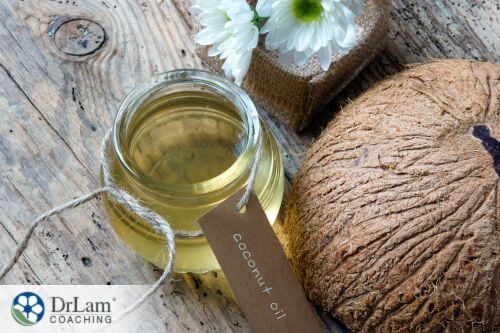 If your skin's itchiness at night is due to eczema, coconut oil could alleviate your symptoms. It can soothe the skin, decrease irritation and itchiness, and reduce the risk of infection. Also, coconut oil has both anti-inflammatory and antioxidant properties. According to research findings published in the Journal of Traditional and Complementary Medicine in 2019, coconut oil can boost the amount of filaggrin in skin cells, which hydrates the skin and improves its moisture barrier. As such, it could be beneficial in treating eczema, which might be the cause of your nocturnal pruritus.
If your skin's itchiness at night is due to eczema, coconut oil could alleviate your symptoms. It can soothe the skin, decrease irritation and itchiness, and reduce the risk of infection. Also, coconut oil has both anti-inflammatory and antioxidant properties. According to research findings published in the Journal of Traditional and Complementary Medicine in 2019, coconut oil can boost the amount of filaggrin in skin cells, which hydrates the skin and improves its moisture barrier. As such, it could be beneficial in treating eczema, which might be the cause of your nocturnal pruritus.
Colloidal oatmeal has been long used to soothe and relieve dry, itchy skin, and is known for its antioxidant and anti-inflammatory properties. Additionally, it prevents transepidermal water loss, helping to keep the skin hydrated and moisturized and strengthens the skin’s protective barrier. In support, a 2015 study indicated that the anti-inflammatory activities of colloidal oatmeal, specifically, Avena sativa, contribute to the effectiveness of ameliorating itch associated with dry, irritated skin. Skin itchiness resulting from eczema, rashes, hives, dryness, or sunburn can be addressed with colloidal oatmeal.
Honey is known for its antibacterial, antioxidant, and anti-inflammatory properties. It can enhance your immune system and support faster healing of wounds. However, the best option is medical-grade honey, like manuka honey. A 2017 research, published in Immunity, Inflammation, and Disease suggests that honey could effectively ameliorate atopic dermatitis, which can cause a very itchy rash.
If your skin itchiness is specific to a particular area of the skin, you can apply a thin layer of honey on the problem area at night. Then, use gauze to cover it, remove the gauze in the morning, and clean the area. However, if you are allergic to honey, you should avoid its use.
Aloe vera is a natural skincare option that contains anti-bacterial, anti-microbial, and immune-boosting properties. It moisturizes and soothes the skin, keeping it hydrated, which helps to prevent or combat dry itchy skin even at night. According to a study published in Phytotherapy Research: PTR, aloe vera gel is as effective as benzyl benzoate as a remedy for scabies that causes intense itching.
When using aloe vera for your itchy skin at night, clean the affected area with unscented soap and water. Then, apply an adequate amount of the aloe vera gel to the area. Furthermore, it’s a good idea to check for sensitivities by testing the gel on a small patch of skin before applying it to a larger area.
Particular supplements may help to prevent and alleviate nocturnal pruritus. The effectiveness of supplementation may depend on the cause of your nighttime itching.
The new and improved LipoNano Glutathione by Dr. Lam is pure and safe with no additives, artificial flavors, or preservatives. It’s produced by a patented fermentation process, is kosher, and is allergen-free. Also, it contains an antioxidant produced by the body that gets rid of toxins. It supports the removal of toxic metabolic waste from your body and helps with the maintenance of the immune system.
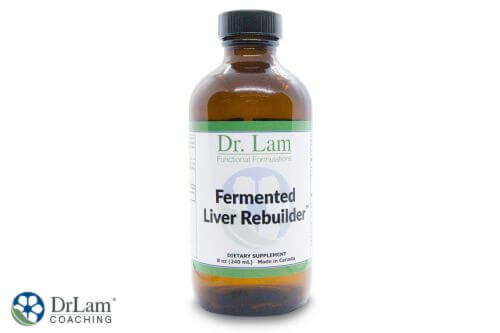 Fermented Liver Rebuilder is a synergy of bioavailable nutrients, beneficial yeasts, bacteria, and enzymes. It is a fermented form of milk thistle that is great for adrenal fatigue sufferers who are sensitive and need the best type of absorption possible. It supports healthy digestion, healthy liver, balances the gut flora, and increases energy.
Fermented Liver Rebuilder is a synergy of bioavailable nutrients, beneficial yeasts, bacteria, and enzymes. It is a fermented form of milk thistle that is great for adrenal fatigue sufferers who are sensitive and need the best type of absorption possible. It supports healthy digestion, healthy liver, balances the gut flora, and increases energy.
This formula contains Silymarin (Silybum marianum), also known as milk thistle, with artichoke and dandelion herbs for their synergistic effects. This formula is vital for liver metabolism and can help the liver's clearance pathways improve.
Dr. Lam’s LiverPax contains a combination of liver boosting herbs along with glutathione that may boost or support your liver and overall wellness.
EstroClear contains calcium-d-glucarate and DIIM to help the liver clear hormones like estrogen. Liver clearance could help mobilize toxins also which can reduce itching.
A product developed by Dr. Lam, the Matrifix Patch specifically helps support a healthy extracellular matrix. Matrifix Patch provides a proprietary activated charcoal poultice in an easy, clean, and ready-to-use patch system. You can put this patch over your liver area to do a gentle detox.
Nocturnal pruritus is an uncomfortable condition that can disrupt sleep and damage your skin. Your itchy skin at night could be caused by several factors, from dehydration, to hormonal changes, to an underlying health condition. However, a proper assessment at your doctor's office can provide an accurate determination of what is causing your itchy skin. Knowing the cause is the best way to determine what remedies will work for you.
If you are experiencing itchy skin at night and would like more insight into what might be causing it or remedies that might work for you, the team at Dr. Lam Coaching can help. We offer a free** no-obligation phone consultation at +1 (626) 571-1234 where we will privately discuss your health concerns and various options. You can also send us a question through our Ask The Doctor system by clicking here.
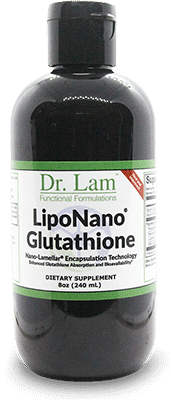
Sleep Better with LipoNano Glutathione
Alangari, A. A., Morris, K., Lwaleed, B. A., Lau, L., Jones, K., Cooper, R., & Jenkins, R. (2017). Honey is potentially effective in the treatment of atopic dermatitis: Clinical and mechanistic studies. Immunity, Inflammation and Disease, 5(2), 190-199. https://doi.org/10.1002/iid3.153
Bhalerao, A., & Mannu, G. S. (2015). Management of pruritus in chronic liver disease. Dermatology research and practice, 2015, 295891. https://doi.org/10.1155/2015/295891
Lavery, M. J., Stull, C., Kinney, M. O., & Yosipovitch, G. (2016). Nocturnal Pruritus: The Battle for a Peaceful Night’s Sleep. International Journal of Molecular Sciences, 17(3). https://doi.org/10.3390/ijms17030425
Mayo Clinic Staff. (n.d.). Itchy skin (pruritus) Mayo Clinic. https://www.mayoclinic.org/diseases-conditions/itchy-skin/symptoms-causes/syc-20355006
Murota, H., & Katayama, I. (2016). Evolving understanding on the aetiology of thermally provoked itch. European Journal of Pain (London, England), 20(1), 47-50. https://doi.org/10.1002/ejp.777
Oyelami, O. A., Onayemi, A., Oyedeji, O. A., & Adeyemi, L. A. (2009). Preliminary study of effectiveness of aloe vera in scabies treatment. Phytotherapy research: PTR, 23(10), 1482–1484. https://doi.org/10.1002/ptr.2614
Reynertson, K. A., Garay, M., Nebus, J., Chon, S., Kaur, S., Mahmood, K., Kizoulis, M., & Southall, M. D. (2015). Anti-inflammatory activities of colloidal oatmeal (Avena sativa) contribute to the effectiveness of oats in treatment of itch associated with dry, irritated skin. Journal of drugs in dermatology : JDD, 14(1), 43–48. Retrieved 24/05/2023, from https://pubmed.ncbi.nlm.nih.gov/25607907/
Varma, S. R., Sivaprakasam, T. O., Arumugam, I., Dilip, N., Raghuraman, M., Pavan, K. B., Rafiq, M., & Paramesh, R. (2018). In vitro anti-inflammatory and skin protective properties of Virgin coconut oil. Journal of traditional and complementary medicine, 9(1), 5–14. https://doi.org/10.1016/j.jtcme.2017.06.012
Zeidler, C., Pereira, M. P., Huet, F., Misery, L., Steinbrink, K., & Ständer, S. (2019). Pruritus in Autoimmune and Inflammatory Dermatoses. Frontiers in immunology, 10, 1303. https://doi.org/10.3389/fimmu.2019.01303
Allergies. (n.d) Cleveland Clinic. Retrieved 25/05/2023, from https://my.clevelandclinic.org/health/diseases/8610-allergies
Nocturnal pruritus can be caused by a range of factors including cortisol release, body temperature, autoimmune disease, liver problems, and an underlying health issue, among other factors. Natural remedies such as colloidal oatmeal, honey, aloe vera, and coconut oil can be used to minimize itching at night and soothe the skin.